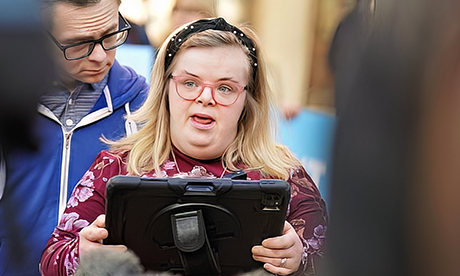A woman with Down syndrome is fighting the UK abortion law at the European Court of Human Rights (ECHR).
Heidi Crowter says the current legislation discriminates against people with disabilities. It allows abortion up to birth if the foetus has a condition such as Down syndrome.
“I am taking this case to Strasbourg because it is downright discrimination that people with disabilities are treated differently,” she says.
Crowter, a 27-year-old mother, has been actively campaigning against the legislation on social media to no avail.
She is preparing to appeal to the ECHR this week because England’s Supreme Court refused to hear her case.
Crowter has campaigned for a law change since 2018. It was then she joined a legal challenge brought by a mother whose son has Down syndrome.
She argues the law’s message is that people with disabilities are not valued equally and that it violates their human rights.
“In 2023, we live in a society where disabled people are valued equally after birth but not in the womb,” she says.
The UK government defends the law as a balance between women’s and unborn children’s rights.
Abortion is a personal choice and women should have access to safe and legal services, the government argues.
The Court of Appeal ruled last November that the law was not unlawful and did not interfere with the rights of those who live with disabilities.
Growing support for Crowter
Disability-rights groups and pro-life organisations support Crowter’s case.
Ross Hendry, CEO of CARE, a Christian charity that advocates for life issues, has this to say:
“It is completely wrong that disability is a ground for abortion up to birth. Would we accept a law allowing babies to be aborted to term based on their sex, or their race? The current approach sends a message that the lives of people with disabilities are worth less than others.”
Lynn Murray, spokesperson for Don’t Screen Us Out has a daughter with Down syndrome.
“It’s inspiring to see that Heidi is now going to be taking her landmark case all the way to … Strasbourg. As a mother of a 23-year-old daughter who has Down syndrome, I see every day the unique value she brings to our family and the positive impact she has on others around her.”
Increasing statistics
There were 3,370 disability-selective abortions in 2021 – a nine percent increase from 3,083 in 2020.
Late-term abortions at 24 weeks’ gestation or over where the baby had a disability increased by 20 percent from 229 to 274.
The law
In England, Wales and Scotland, there is a general 24-week time limit for abortion.
If the baby has a disability, including Down syndrome, cleft lip or a club foot, abortion is a egal right up to birth.
If Crowter wins her case at the ECHR in Strasbourg, it could have implications for all 46 Council of Europe countries as they are bound by its rulings.
Crowter hopes her case will inspire others to stand up for their human rights and dignity.
The ECHR decision is expected to be issued sometime in 2023.
Source
Additional readingNews category: World.




